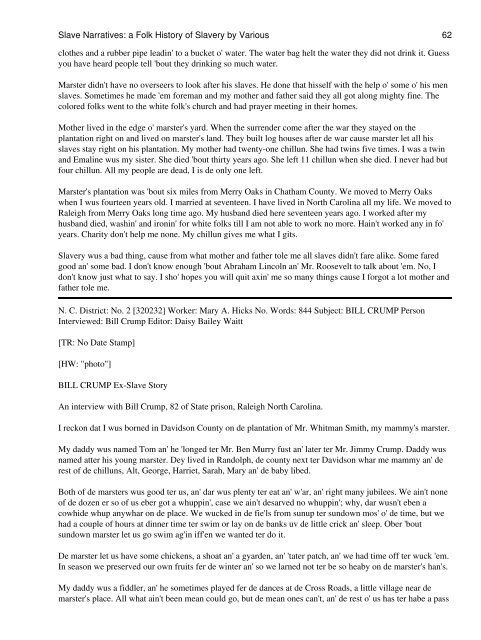Slave Narratives: a Folk History of Slavery in the United States
Slave Narratives: a Folk History of Slavery in the United States
Slave Narratives: a Folk History of Slavery in the United States
You also want an ePaper? Increase the reach of your titles
YUMPU automatically turns print PDFs into web optimized ePapers that Google loves.
<strong>Slave</strong> <strong>Narratives</strong>: a <strong>Folk</strong> <strong>History</strong> <strong>of</strong> <strong>Slave</strong>ry by Various 62clo<strong>the</strong>s and a rubber pipe lead<strong>in</strong>' to a bucket o' water. The water bag helt <strong>the</strong> water <strong>the</strong>y did not dr<strong>in</strong>k it. Guessyou have heard people tell 'bout <strong>the</strong>y dr<strong>in</strong>k<strong>in</strong>g so much water.Marster didn't have no overseers to look after his slaves. He done that hisself with <strong>the</strong> help o' some o' his menslaves. Sometimes he made 'em foreman and my mo<strong>the</strong>r and fa<strong>the</strong>r said <strong>the</strong>y all got along mighty f<strong>in</strong>e. Thecolored folks went to <strong>the</strong> white folk's church and had prayer meet<strong>in</strong>g <strong>in</strong> <strong>the</strong>ir homes.Mo<strong>the</strong>r lived <strong>in</strong> <strong>the</strong> edge o' marster's yard. When <strong>the</strong> surrender come after <strong>the</strong> war <strong>the</strong>y stayed on <strong>the</strong>plantation right on and lived on marster's land. They built log houses after de war cause marster let all hisslaves stay right on his plantation. My mo<strong>the</strong>r had twenty-one chillun. She had tw<strong>in</strong>s five times. I was a tw<strong>in</strong>and Emal<strong>in</strong>e wus my sister. She died 'bout thirty years ago. She left 11 chillun when she died. I never had butfour chillun. All my people are dead, I is de only one left.Marster's plantation was 'bout six miles from Merry Oaks <strong>in</strong> Chatham County. We moved to Merry Oakswhen I wus fourteen years old. I married at seventeen. I have lived <strong>in</strong> North Carol<strong>in</strong>a all my life. We moved toRaleigh from Merry Oaks long time ago. My husband died here seventeen years ago. I worked after myhusband died, wash<strong>in</strong>' and iron<strong>in</strong>' for white folks till I am not able to work no more. Ha<strong>in</strong>'t worked any <strong>in</strong> fo'years. Charity don't help me none. My chillun gives me what I gits.<strong>Slave</strong>ry wus a bad th<strong>in</strong>g, cause from what mo<strong>the</strong>r and fa<strong>the</strong>r tole me all slaves didn't fare alike. Some faredgood an' some bad. I don't know enough 'bout Abraham L<strong>in</strong>coln an' Mr. Roosevelt to talk about 'em. No, Idon't know just what to say. I sho' hopes you will quit ax<strong>in</strong>' me so many th<strong>in</strong>gs cause I forgot a lot mo<strong>the</strong>r andfa<strong>the</strong>r tole me.N. C. District: No. 2 [320232] Worker: Mary A. Hicks No. Words: 844 Subject: BILL CRUMP PersonInterviewed: Bill Crump Editor: Daisy Bailey Waitt[TR: No Date Stamp][HW: "photo"]BILL CRUMP Ex-<strong>Slave</strong> StoryAn <strong>in</strong>terview with Bill Crump, 82 <strong>of</strong> State prison, Raleigh North Carol<strong>in</strong>a.I reckon dat I wus borned <strong>in</strong> Davidson County on de plantation <strong>of</strong> Mr. Whitman Smith, my mammy's marster.My daddy wus named Tom an' he 'longed ter Mr. Ben Murry fust an' later ter Mr. Jimmy Crump. Daddy wusnamed atter his young marster. Dey lived <strong>in</strong> Randolph, de county next ter Davidson whar me mammy an' derest <strong>of</strong> de chilluns, Alt, George, Harriet, Sarah, Mary an' de baby libed.Both <strong>of</strong> de marsters wus good ter us, an' dar wus plenty ter eat an' w'ar, an' right many jubilees. We a<strong>in</strong>'t none<strong>of</strong> de dozen er so <strong>of</strong> us eber got a whupp<strong>in</strong>', case we a<strong>in</strong>'t desarved no whupp<strong>in</strong>'; why, dar wusn't eben acowhide whup anywhar on de place. We wucked <strong>in</strong> de fie'ls from sunup ter sundown mos' o' de time, but wehad a couple <strong>of</strong> hours at d<strong>in</strong>ner time ter swim or lay on de banks uv de little crick an' sleep. Ober 'boutsundown marster let us go swim ag'<strong>in</strong> iff'en we wanted ter do it.De marster let us have some chickens, a shoat an' a gyarden, an' 'tater patch, an' we had time <strong>of</strong>f ter wuck 'em.In season we preserved our own fruits fer de w<strong>in</strong>ter an' so we larned not ter be so heaby on de marster's han's.My daddy wus a fiddler, an' he sometimes played fer de dances at de Cross Roads, a little village near demarster's place. All what a<strong>in</strong>'t been mean could go, but de mean ones can't, an' de rest o' us has ter habe a pass
















